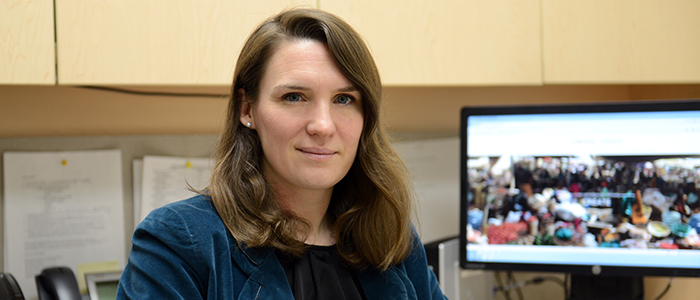A global mission to help conquer mental illness

Creating new and innovative ways to solve problems and answer questions is what keeps Dr. Arlene MacDougall excited about her work.
“What I love about research is having the opportunity to come up with new ideas and collaborate with people from other fields and disciplines,” Dr. MacDougall said. “It’s really exciting to bring people together to start something new, to fill a gap instead of continuing to think the way that we’re already doing something is enough.”
A clinician-researcher with the Department of Psychiatry at Schulich Medicine & Dentistry, Dr. MacDougall works as a psychiatrist with the Prevention and Early Intervention Program for Psychoses (PEPP) at London Health Sciences Centre.
She is also involved in several research projects that focus on both global mental health and early psychosis.
Dr. MacDougall recently received a Grand Challenges Canada Stars in Global Health grant to begin a project called Community REcovery Achieved Through Entrepreneurism (CREATE).
Based in Kenya, the project will develop a business that is designed to employ people with mental illness and will provide an accompanying toolkit of psychological and social support that promotes recovery and successful reintegration into society.
Dr. MacDougall is also leading two other research projects. One is looking at youth-focused mindfulness group intervention for people with early psychosis, and the other is using participatory video as a way of engaging people with early psychosis to help them develop a narrative or life story about their experience with illness.
From a young age, Dr. MacDougall was interested in a career that involved medicine and helping people, but it was only when she started medical school that she started to consider psychiatry.
“Some of the most vulnerable, marginalized people in our population have serious mental illness,” she said. “I realized that a really important way to help these people was to be trained in psychiatry and then do research to develop new interventions that support them not just as patients or people with mental illness, but as people.”
Dr. MacDougall hopes the work that she is currently doing will help her patients focus on their abilities instead of their disabilities, and see that they have value and can contribute to their communities.
“When you see people go through a very difficult event or episode and come away stronger, healthier and able to look back and see how far they’ve come, that’s pretty amazing,” she said.








